After returning from Seeds of Peace Camp to the Maine Girls Academy in Portland, sisters Naissa and Pricillia noticed a lack of civil discourse in their school.
Along with the increasing sense of division they felt in the world at large, the girls realized there was no space in school for students to talk about difficult topics with respect and an open mind. This stood in stark contrast to what they had just experienced at Camp and it bothered them. So they decided to do something about it.
“What’s happening around the world has an impact on the way we move, the way we think in this building,” said Naissa. “We need to respect everybody’s differences. Everyone has so many different experiences, and invalidating them is just really wrong. I said, ‘hey, let’s have a dialogue.’”
 Maine Seeds Pricillia and Naissa
Maine Seeds Pricillia and Naissa
Over the last two years, they worked with their classmates and faculty to make civil conversation the centerpiece of life at the Maine Girls Academy. The sisters first approached History and Social Humanities teacher Brendan Curran with their plan to create a forum for meaningful dialogue within the school.
Explaining what sold him on the idea, Curran said, “Part of it is developing empathy, part of it is being compassionate listeners, part of it is learning how to talk about something that’s hard and to consider other viewpoints. The goal is not to come to any type of consensus.”
Working together, the sisters and their teacher developed the program into CivilTEA (the name’s an inside joke, say the students.) Now, it’s part of the school’s regular curriculum.
The topic for each CivilTEA is chosen by students working together with adult facilitators. The conversations are led by students who have been trained to facilitate (and who continue their training throughout the school year).
The discussions first start in small groups, usually beginning with a presentation or guest speaker. From there, the facilitator-guided groups dive into challenging conversations where students not only voice their opinions and questions, but listen carefully when others do the same.
One goal is that everyone involved has a safe place to listen and be heard. “A lot of times in high school, only certain people have found their voice,” said Deb Bicknell, a CivilTEA facilitation trainer and Seeds Educator Program facilitator who helped Maine Girls Academy form its own dialogue course. “In these groups it’s really about how to talk and listen in a respectful manner. A lot of what the girls learn is about being present.”
Another goal is to help students develop their personal voice, discover their own values, and gain skills in discourse for use later in life. “Having these dialogues at school gave me the opportunity to voice my opinion and show that I have an understanding of why these conversations are important to have,” said Pricillia, now a college student.
Through CivilTEA, students and faculty alike are able to discover things they may not have learned at home or in the classroom. Perhaps more importantly, they’re developing a better understanding of one another.
If you’re a Seed working on a meaningful project—no matter where you are in your journey—please let us know. We’d love to share your success story!

